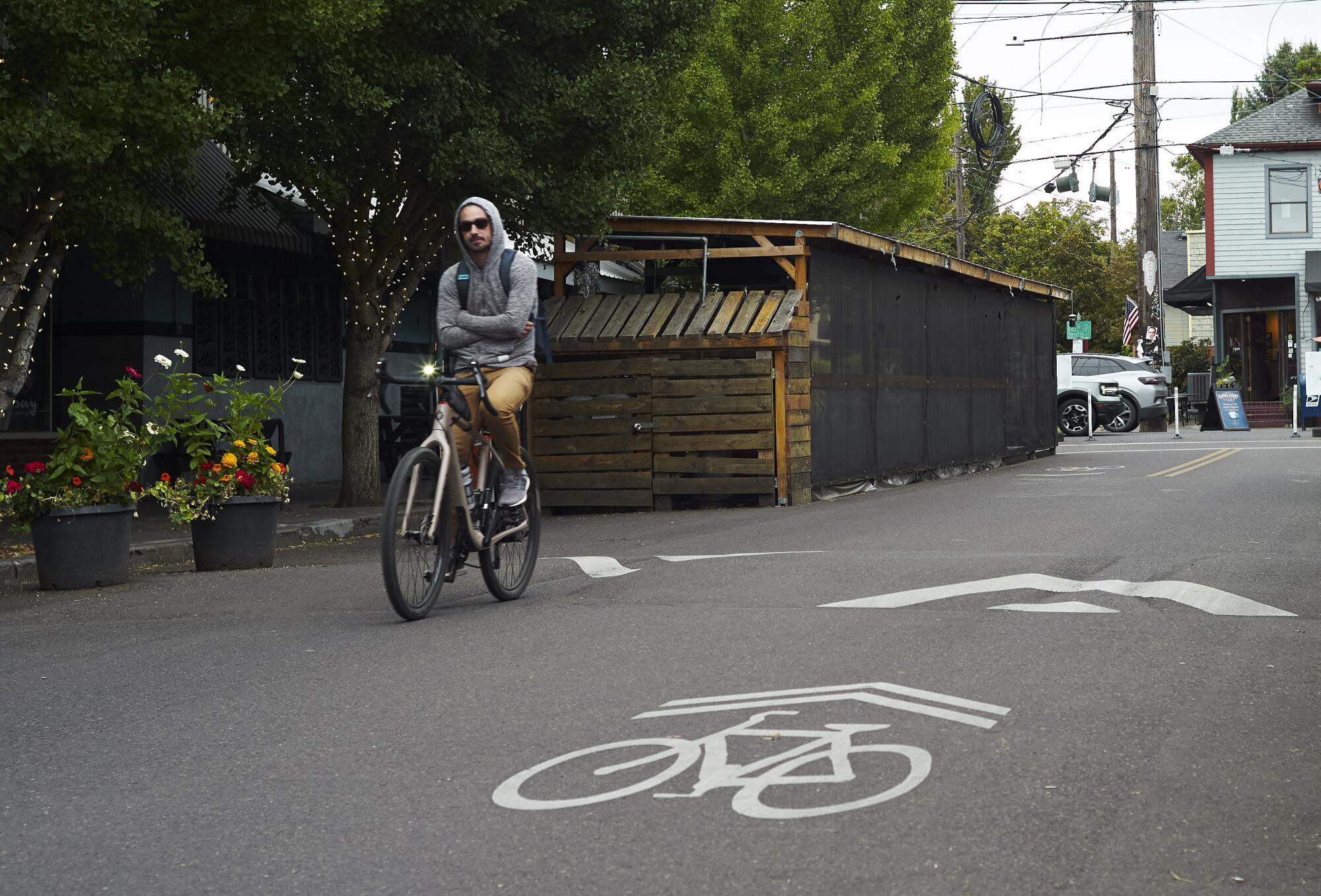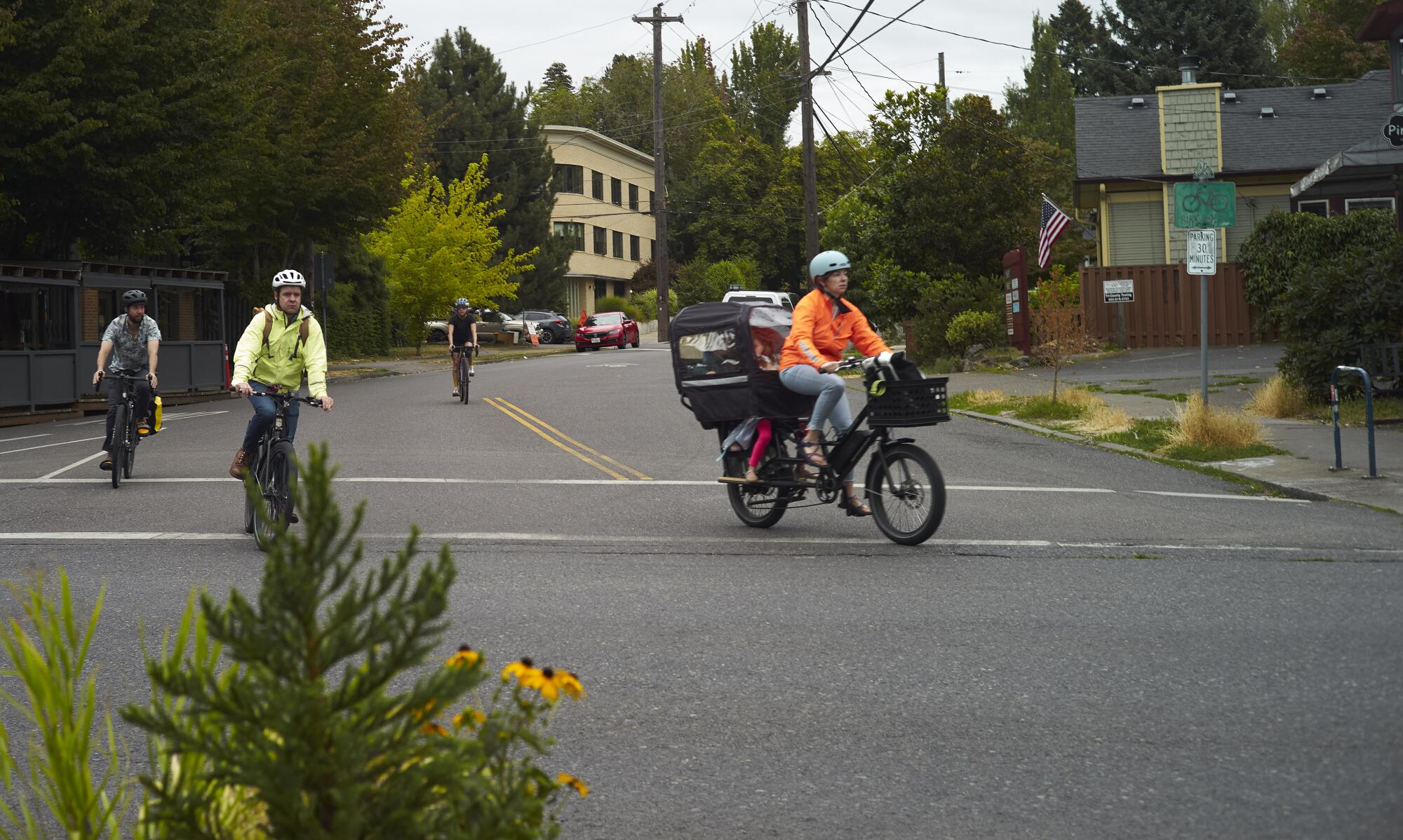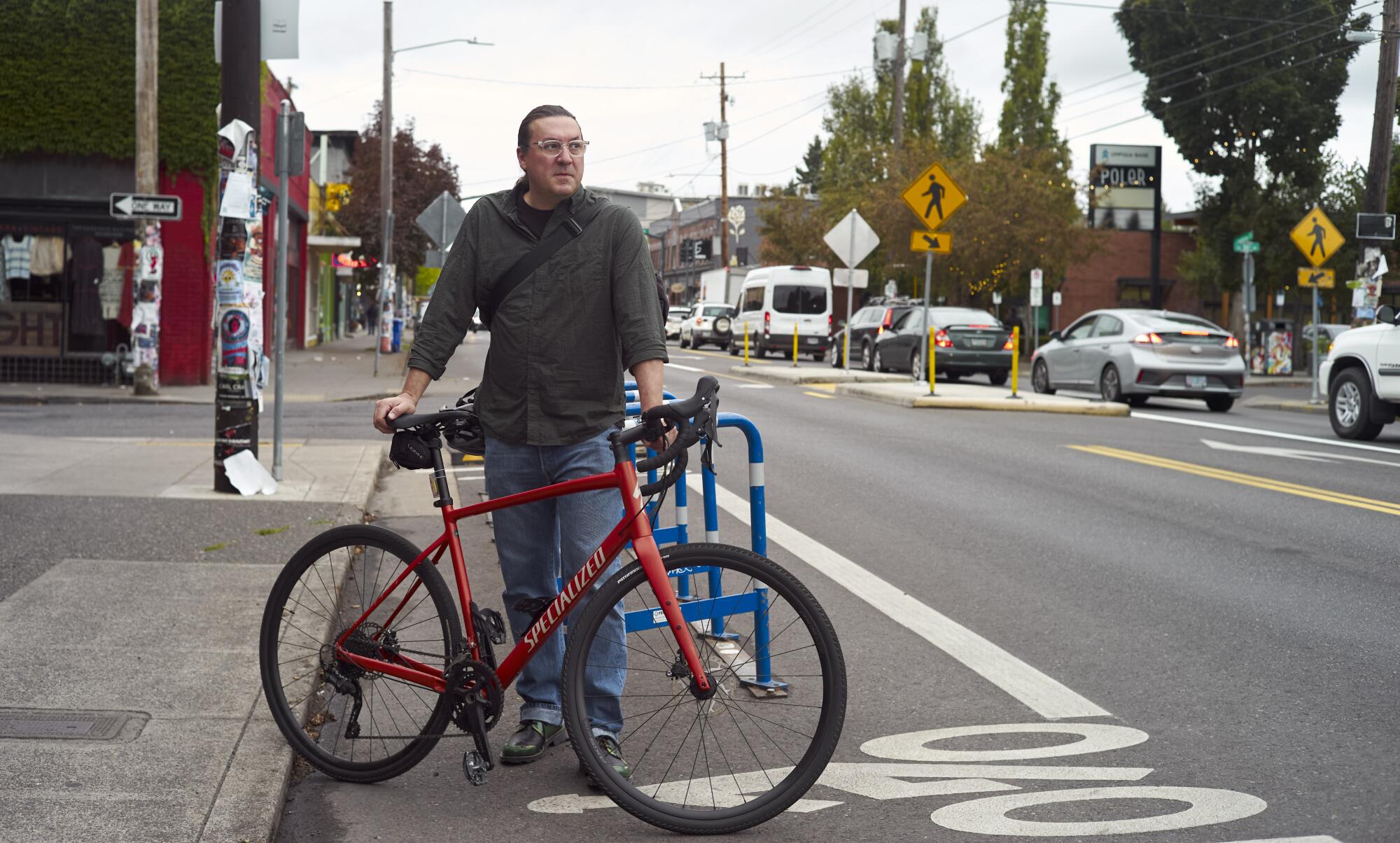
- Share via
PORTLAND, Ore. — The story of how Bryan Hance became one of the most celebrated and cynical investigators of multinational bike theft began in the spring of 2020, in the dark heart of the pandemic.
Bikes were suddenly in short supply, because so many people — trapped at home and afraid of catching COVID on public transportation — wanted to buy them. Predictably, bike theft exploded across the country.
Hance, 48, saw it happen in real time. A cybersecurity engineer with flowing brown locks and a taste for soy lattes, Hance is co-founder of a site called Bike Index. It’s a nonprofit where cyclists can register their bikes and contact information, making it easier to reunite lost or stolen bikes with their owners.
Bike Index now registers the descriptions and serial numbers of about 1.3 million bikes worldwide. But when Hance started the site in 2013, it was a simpler era of theft. Back then, it was mostly a crime of opportunity: Single bikes would disappear from garages or street corners, taken by petty thieves usually wielding nothing more than bolt cutters. Hance’s site allowed police to reunite bikes with their owners if they were found or discarded. And it allowed buyers who cared about such things to do their due diligence to make sure they weren’t buying a stolen bike.
But in spring 2020, Hance was tipped to something new: Scores of high-end bikes that matched the descriptions of bikes reported stolen from locations across the Bay Area were turning up for sale on Facebook Marketplace and Instagram pages attached to someone in Mexico, thousands of miles away.
Hance, an avid cyclist, couldn’t let it stand. From his home in Portland, he set out to crack the case — and in the process, he and others say, exposed disappointing lapses in the reach of U.S. law enforcement and the systems that Meta, the parent company of Facebook and Instagram, has set up to prevent trafficking in stolen goods.
“The guy is still operating,” he said of the bike seller in Mexico he has been watching for so long. “We could do the whole thing again.”

From the moment he began perusing the Mexican bike seller’s listings, Hance believed he was seeing something new and shocking: How were all these bikes, matching descriptions of those stolen from homes in Mountain View and San Jose and Santa Clara, winding up on an online sales platform based near Guadalajara within a few weeks?
He suspected he had stumbled upon an organized multinational ring.
He began putting the digital pieces together. A Bay Area cyclist would report a theft to Bike Index, supplying a photo of the bike and its serial number, along with a description of any modifications made, like special tires, brakes and stickers. Hance would peruse the Facebook and Instagram pages of the seller in Mexico. Again and again, he would find bikes for sale that matched the descriptions of Bay Area bikes reported stolen.
This took a little work: The Facebook page he first spotted disappeared, replaced by pages that were blocked to U.S. computers; Hance managed to get in anyway, thanks to creative use of a VPN.
He started reaching out to the owners whose stolen bikes he suspected he was seeing for sale. “Can you tell me a little bit about how your bike was stolen,” he would ask. Often, the methods were sophisticated and selective. Thieves would break into a bicycle room at an apartment complex with a specialized saw and leave minutes later with only the fanciest mountain bikes.

He urged victims to report the thefts, something many had not bothered to do because police often do not take bike theft seriously. He wanted people to ask police to call him, so he could share what he was seeing online. Over time, he spoke to more than a dozen officers in jurisdictions across the Bay Area, including Alameda, Santa Clara, Santa Cruz, Marin, Napa and Sonoma counties.
The conversations were cordial but rarely fruitful. This was the summer of 2020. There was a pandemic. Civil unrest. A looming presidential election. And here was Hance, telling officers that he believed he had located a stolen bike, in Mexico.
“That’s gone,” the officer would inform him. Or, one time, according to Hance: “We’re not Interpol.”
Hance also tried to get Meta to do something. After all, he had identified what could be hundreds of stolen bikes being sold on its platforms, valued, he estimated, at well over $2 million. He said he got nowhere.
Officials at Meta did not respond to The Times’ request for comment.

“I wanted somebody to care,” Hance said. These were expensive bicycles. And to many of the people who rode them, they were something more: a trusted companion; their way of moving through the world. And it seemed that someone was orchestrating a scheme to steal them en masse and spirit them out of the country.
Hance understood the connection that devoted cyclists have with their bikes. He’d had a bike stolen back in college at the University of Arizona, and it broke his heart. He relied on that bike to get to work. When it was stolen, his whole life was scrambled.
“We have this attachment to something that takes us somewhere,” he said. “Everything is better on a bike.”
Hance recognized “the futility of trying to chase something that had crossed the U.S. border.” Still, he wondered, wasn’t there something that could be done?
Around this time, another tip came in to Bike Index: There was a Mexican seller, this time in Ciudad Juarez, who appeared to be doing a brisk trade in bikes stolen from Colorado. The MO was strikingly similar: The bikes were for sale on a Facebook page that had once been visible in the U.S. but was now available only in Mexico.
Hance began digging through Bike Index, and was able to match bikes listed for sale with people who had reported their bikes stolen. Owners often were able to identify their bikes, even without the serial numbers, because they had customized them in specific ways. “That is 100% my bike,” one victim wrote Hance. “I had the same different front brake from the rear.”
As in the Bay Area, what was going on in Colorado seemed to represent a coordinated effort rather than a crime of convenience. Hance was hearing about bikes looted from multiple cities. Some were stolen from garages or apartment bike rooms. In one case, thieves stole a moving van and rammed it through the plate glass window of a bike shop, loading up high-end bicycles and speeding away.

And yet, many of those bikes appeared to have wound up in the same place: on the social media platforms of a man in Juarez. The seller, Hance concluded, “is at the end of some organized effort to collect, ship and resell bikes stolen by multiple thieves in multiple cities.”
Hance did the same thing he had done in the Bay Area, urging the bike owners to contact police.
He is tight-lipped about the extent of his involvement with what happened next.
On Nov. 21, 2021, the Colorado attorney general’s office indicted eight people on 227 counts of theft, including 29 bike shop burglaries. The AG reported that in one burglary, “the suspects stole $90,000 worth of bicycles in under five minutes.”
One of the indictments said that an alleged conspirator had driven his truck across the border between El Paso and Juarez 158 times in one year.
That same alleged conspirator, according to the indictment, had a history of making large cash withdrawals in the Denver area — followed by large cash deposits at banks in El Paso — at times that corresponded with bike store robberies. It was a pattern that could be consistent with a fence paying off thieves for snatching bikes in Colorado and then depositing the proceeds after selling the bikes in Mexico.
Eventually, all those charged pleaded guilty, according to the Colorado attorney general’s office.
Stolen water is an indelible part of California lore. But the federal case against Dennis Falaschi, longtime head of the Panoche Water District, alleges one of the most audacious water grabs in modern history.
Meanwhile, Hance had continued to watch the Bay Area operation. He believed he’d figured out the identity of the seller in Jalisco, and was monitoring that person’s personal social media accounts.
In early 2021, he had spotted something that might break open the case: the name of a person who was sending the Jalisco seller photos of bikes that matched descriptions of those reported stolen by Bay Area cyclists. Hance theorized that person could be a fence who was collecting stolen bikes on this side of the border and sending photos to Jalisco so they could be posted for sale.
Hance hunted through the Jalisco seller’s Facebook friends until he found the name there: Victor Romero, of San Jose.
More sleuthing revealed that a man by the name of Victor Romero ran an auto shop in San Jose, and, judging by his own Facebook photos, was an avid mountain biker.
There was something else: Romero’s auto shop in San Jose had distinctive orange shelves. One photo of a bike listed for sale on the Jalisco seller’s site had similar orange shelves in the backdrop.
Hance contacted a San Francisco police detective who had seemed interested in what he was doing. Check out this guy’s auto shop, he advised.
San Francisco police raided Romero in the spring of 2021. They found more than $200,000 in cash, according to a federal indictment, along with screenshots from his phone they said showed Romero’s proceeds from trafficking in stolen bikes. They also found a Kona Process 153 mountain bike valued at about $4,700 that had been reported stolen from an apartment garage in San Francisco, according to the indictment. It had been disassembled and packaged for shipment to Jalisco.

In January, a federal grand jury indicted Victoriano Romero on felony conspiracy charges for his alleged role in a scheme to purchase high-end stolen bicycles from thieves across the Bay Area and transport them to Mexico for resale.
Romero has pleaded not guilty. He declined to speak with a Times reporter who called him for comment, and his lawyer did not respond to phone calls.
The U.S. attorney’s office trumpeted the arrest in a news release, and media across the country wrote about it. Christopher Solomon documented Hance’s detective work in a story for Wired Magazine.
Hance was gratified — but also disheartened. From his perspective, the enforcement efforts were targeting small cogs in a much larger network. From what Hance could see, the Jalisco seller hardly broke his stride. Bikes matching the descriptions of those reported stolen from Oregon, San Diego and Colorado began appearing on his sales pages shortly after Romero’s arrest.
And the guy in Jalisco appeared to be far from the only operator.
This summer, Hance heard from a woman named Katie Webb in Seattle, whose bike was stolen out of her apartment’s bike room by thieves who showed up with an angle grinder capable of slicing through steel.
Her story had an interesting twist. After she had posted the theft on Bike Index, she heard from a man in Mexico who said he had seen a similar bike for sale on a Facebook site in the state of Puebla. Webb, 41, a graduate student in public health who commutes by bike, said it was definitely her bike; it bore the sticker of the Seattle bike shop where she bought it.
“I was just so dumbstruck that my bike had ended up in Mexico,” she said. “What is this craziness?”
Hance promised to take a look.
Because as cynical as he is about the possibility of stemming such theft, Hance isn’t ready to quit his volunteer job as bike detective.
“I keep getting emails,” he said. “And I’m the only one doing it. And you know, stupid me, I want to move on and do other things, but it’s just so egregious, and so out in the open. I haven’t quite put it down yet.”
More to Read
Sign up for This Evening's Big Stories
Catch up on the day with the 7 biggest L.A. Times stories in your inbox every weekday evening.
You may occasionally receive promotional content from the Los Angeles Times.












